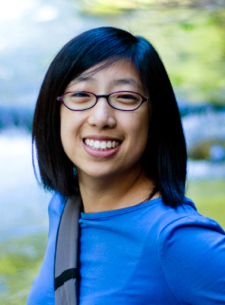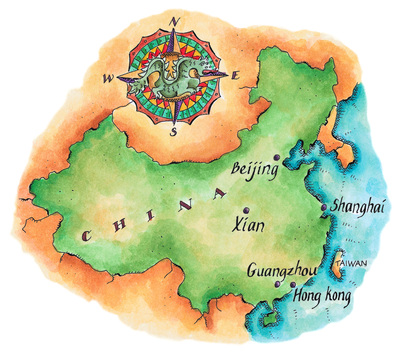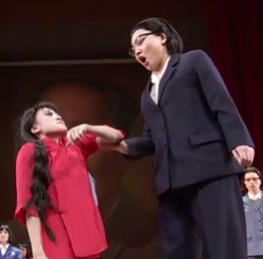By Patricia Hickson

Even though Catherine Tsang comes from a Chinese-speaking family that sent her to language classes, this was not enough to qualify her for fluent-speaker status. She is now acquiring “superior proficiency” through the Flagship program, while also majoring in biology.
To the average American English speaker, Chinese can appear impenetrable. Its characters, sounds and semantics don’t match up with the morphology of English—hence the phrase: “It’s all Chinese to me!”
“Learning Chinese is really, really hard,” confirmed Denise Gigliotti, a native of China who now teaches first-year Chinese at the UO. “Ideally you practice two to three hours every single day. A student needs at least 1,000 hours of steady practice, just to talk UO.”
But there are also appreciable numbers of students who arrive with advanced Chinese skills—and also those with less experience but with an exceptional drive to excel in the world’s most dominant language—and for them, the UO offers a special opportunity.
Critical to National Security
Consider this confluence of resources at the UO for students who are serious about Chinese: the UO is home to the oldest East Asian Studies Program in the country as well as a vibrant Center for Asian and Pacific Studies and a new Confucius Institute. Students have ample opportunity to explore the language, history and culture of China from multiple dimensions.
Moreover, in 2005, the UO was awarded a federal contract to develop both a K–12 and an undergraduate Chinese Flagship program. Funded by the National Security Education Program, the goal of the program has been to address significant deficits in languages deemed critical to national security. Other Flagship programs focus on Arabic, Hindi-Urdu, Korean, Persian, Russian and Swahili.
 “People in China, in the Middle East— they know about American diplomacy, business and research because they speak English. You can’t say the same is true for the average international business person in America,” said Carl Falsgraf, director of the UO’s Center for Applied Second Language Studies, which oversees the financial administration of the Chinese Flagship Program.
“People in China, in the Middle East— they know about American diplomacy, business and research because they speak English. You can’t say the same is true for the average international business person in America,” said Carl Falsgraf, director of the UO’s Center for Applied Second Language Studies, which oversees the financial administration of the Chinese Flagship Program.
Currently, the UO is one of only nine university-affiliated Chinese Language Flagship programs in the country. The program unites academic content, field experience and intensive language instruction “to produce graduates with a sophisticated level of cultural and professional proficiency,” said Falsgraf. “We want them to be able to engage in a high level of discourse on a wide variety of subjects based on their area of specialization, whether that’s computer science or both.”
Catherine Tsang is a Flagship student and a biology major. Biology all by itself is a demanding major with a highly prescribed program of study and many, many hours of lab time. Nonetheless, Tsang says she “definitely spent more time on Mandarin than biology” at the beginning of her Flagship experience.
And this despite the fact that Tsang is a “heritage” Chinese speaker, i.e., she comes from a Chinese-speaking family that sent her to language classes. But this was not enough to qualify her for fluent speaker status. “It is more complicated than that,” said Tsang. “Having never lived outside of the U.S., it took more than going to a weekend language school to develop Mandarin fluency."
Her determination to push herself toward mastery has paid off. Last spring she was accepted to the Flagship's China program and is currently taking biology classes at Nanjing University.
Initially, the Flagship Program was tailored to students matriculating from a K-12 Chinese immersion program like the one in Portland (also supported by the UO and funded by the NSEP award). Today, many who enter Flagship still come in with advanced Chinese
speaking abilities, whether from the K-12 immersion school or from elsewhere.
speaking abilities, whether from the K-12 immersion school or from elsewhere.
However, there's now greater emphasis on finding highly motivated students from all experience levels and helping them quickly prepare for the content courses that are at the heart of the Flagship program.
These are UO courses in science, journalism and urban planning-among others-taught in Chinese.
"The UO has an incredibly broad representation of faculty proficient in Chinese," said Epstein. "As an advanced Chinese language student, you have access to course material in many subjects." This means not only Flagship students, but also those pursuing their master’s or doctoral degrees in Chinese, Asian studies or other related fields.
Among the courses offered this year will be Physics: Solar and Renewable Energy taught by Fuding Lin; Chinese Folklore taught by Dai Lan; and Human Physiology: The Sports and Medicine of China taught by Li-Shan Chou.
Capstone Year in China
Currently, fifty-four students are enrolled in Flagship, about one-third of whom are heritage speakers. Resources include an immersion residence hall, peer language tutors and immersive social events and retreats. To help students gain invaluable experience in China, they are encouraged to pursue summer intensive programs (many of them funded by grants). To become nationally certified, they must complete a capstone year in China, and there is often partial or full funding available for that.
Recent Flagship graduate Lauren Dickey completed her year at Nanjing in 2010, then returned to complete her honors thesis on China’s sale of weapons to Africa in exchange for oil, which she wrote in both English and Chinese. This fall she will start a one-year master’s program with the School of Oriental and African Studies at the University of London.
Dickey’s path to fluency started with a high school exchange year in Taiwan. China had been her third choice of countries when she applied for the program; her original plan was to study French at the University of Illinois (her home state). But after a year in Taiwan she was hooked on the language and the culture. Upon her return to the states she sought out opportunities to advance her newly acquired language skills and chose the UO because of the Chinese Flagship.
“I feel very confident about my plans for the future,” she said.
And she should.
Photo by Mengyu Chen




 Watch
Watch  Watch excerpts from the opera, coming soon to Eugene.
Watch excerpts from the opera, coming soon to Eugene. 

 Three’s a charm for a living memorial.
Three’s a charm for a living memorial.